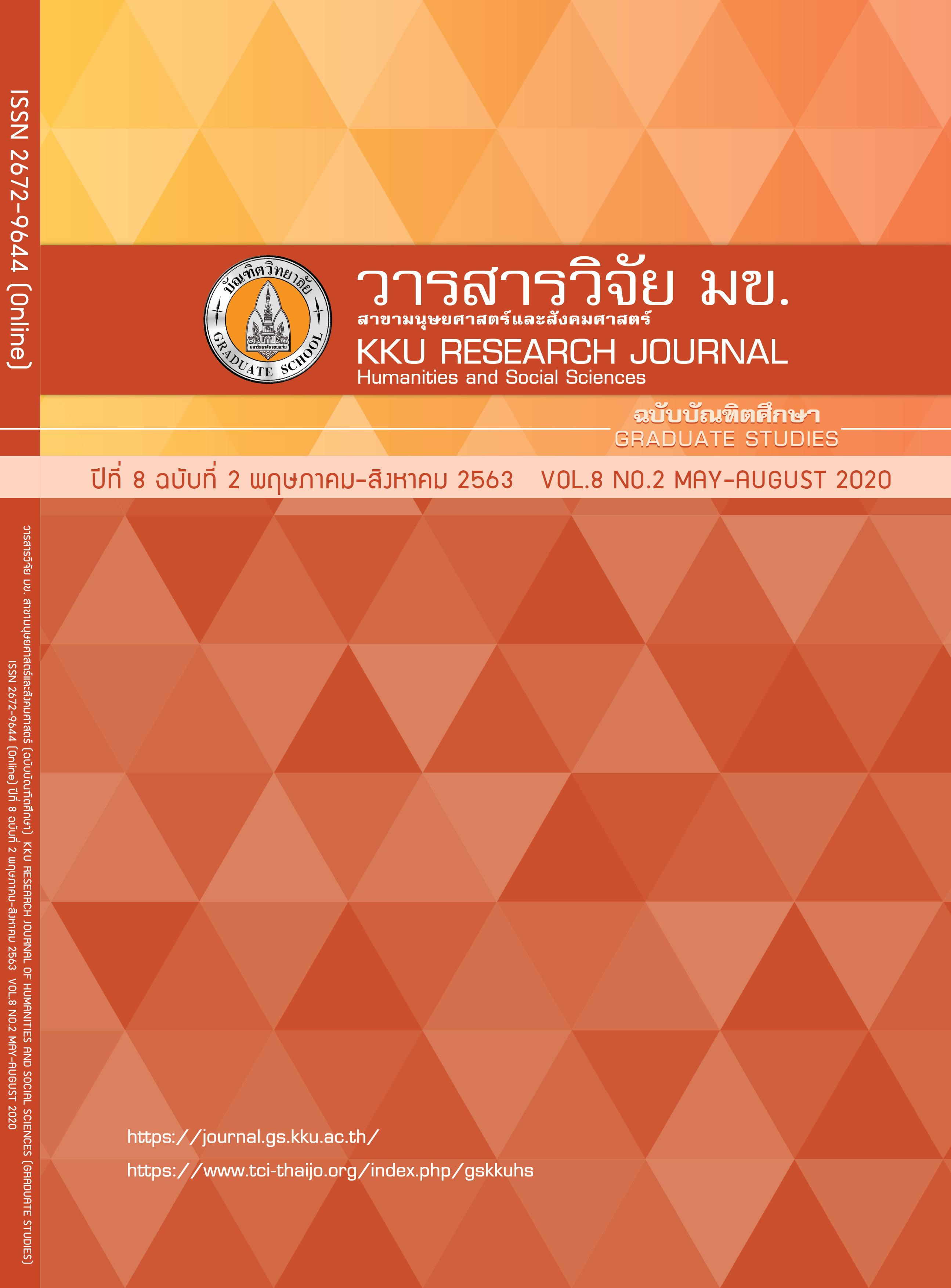The Effect of Cooperative Learning on Students’ Speaking Self-efficacy
Keywords:
Cooperative learning, Self-efficacy, AttitudesAbstract
This study aimed to investigate the improvement of student’s speaking self-efficacy employing cooperative learning. One group of 31 participants studying in Mattayom Suksa 5 (Grade 11), Phanomphrai Wittayakarn School who possessed different levels of English proficiency were taught with six different CL activities for six weeks. The treatment took 50 minutes per session. The data was collected through a pre- and post-treatment questionnaire with the 5-point Likert scale to examine the change of students’ speaking self-efficacy while the student written journal log was employed to evaluate the opinions of students towards their speaking self-efficacy. The findings showed the progress of students’ speaking self-efficacy in all levels especially Group B (level B1). In light of student feedback, a positive trend was shown. From the findings, it is recommended for teachers to employ cooperative learning in the class to create a stress-free environment and to enhance students’ speaking self-efficacy. The results of this study can be taken into consideration by course designers, teachers, and learners.
References
achievement and knowledge retention. International Journal of
Higher Education. 2014; 3(2): 131-140.
2. Lucena RJ, Jose AES. Co-operative learning in enhancing the
speaking skills of students: a phenomenological approach.
International Journal of Advanced Multidisciplinary Research (IJAMR).
2016; 3(2): 67-71.
3. Johnson DW, Johnson RT, Smith K. The state of cooperative
learning in postsecondary and professional settings. Educational
Psychology Review. 2007; 19(1): 15-29.
4. Akhtar M. What is self-efficacy? Bandura’s four sources of
efficacy belief [Internet]. 2008 [updated 2008 Nov 08; cited 2018 May 15].
Available from: http://positivepsychology.org.uk/self-efficacy-definition-
bandura-meaning/
5. Annurwanda P. The Effect of Teams Games Tournament on
Mathematics Self-Efficacy in Junior High Schools. SHS Web of
Conferences. 42. 00079. 2018.
6. Mills N, Pajares F, Herron C. A re-evaluation of the role of anxiety;
Self-efficacy, anxiety, and their relation to reading and listening proficiency.
Foreign Language Annuals. 2006; 39(2): 273-292.
7. Raoofi S, Tan BH, Chan SH. Self-efficacy in second/foreign language
learning contexts. English Language Teaching. 2012; 5(11): 60-73.
8. Zimmerman B, Schunk D. Motivation: An essential dimension of
self-regulated learning. In D. Schunk & B. Zimmerman (Eds.).
Motivation and self-regulated learning. New York: Lawrence Erlbaum
Associates; 2008. p.1-30.
9. Prasongporn P. English Education at Primary Level in Thailand.
National Institute for Educational Policy Research (NIER). 2016; 111-115.
10. Wiriyachitra A. English Language Teaching and Learning in Thailand
in This Decade. The College of Information Sciences and Technology.
Thai TESOL Focus. 2002; 15(1): 4-9.
11. Anyadubalu CC. Self-efficacy, anxiety, and performance in the
English language among middle-school students in English Language
Program in Satri Si Suriyothai School, Bangkok. International Journal
of Social Sciences. 2010; 5(3): 193-198.
12. Asakereh A, Dehghannezhad M. Student Satisfaction with EFL
Speaking Classes: Relating Speaking Self-Efficacy and Skills Achievement.
Issues in Educational Research. 2015; 25(4): 345-363.
13. Johnson DW, Johnson RT. New Developments in Social Interdependence
Theory. Genetic, Social, & General Psychology Monographs. 2005; 131(4):
285-358.
14. Al-Tamimi N, Attamimi RA. Effectiveness of cooperative learning
in enhancing speaking skills and attitudes towards learning English.
International Journal of Linguistics. 2014; 6(4): 27-45.
15. Bandura A. Self-Efficacy: The Exercise of Control. New York:
W.H. Freeman and Company; 1997.
16. Suwantarathip O, Wichadee S. The impact of cooperative learning
on anxiety and proficiency in an EFL class. Journal of College Teaching &
Learning. 2010; 7(11): 51-58.
17. Worde R. Students’ perspectives on foreign language anxiety
[Internet]. 2003 [updated 2003 Feb 10; cited 2019 Jul 15]. Available from:
http://www.vccaedu.org/inquiry/inquiry-spring2003/i-81-worde.html
18. Mari JS, Gumel SA. Effects of Jigsaw Model of Cooperative Learning
on Self-Efficacy and Achievement in Chemistry among Concrete and
Formal Reasoners in Colleges of Education in Nigeria. International Journal
of Information and Education Technology. 2015; 5(3): 196-199.
19. Sengul S, Katranci Y. Effects of jigsaw technique on mathematics
self-efficacy perceptions of seventh grade primary school students.
Procedia – Social and Behavioral Sciences. 2014; (116): 333-338.
20. Tran VD, Lewis R. The effects of Jigsaw Learning on Students’
Attitudes in a Vietnamese Higher Education Classroom. International
Journal of Higher Education. 2012; 1(2): 9-19.




